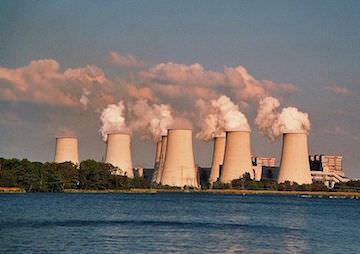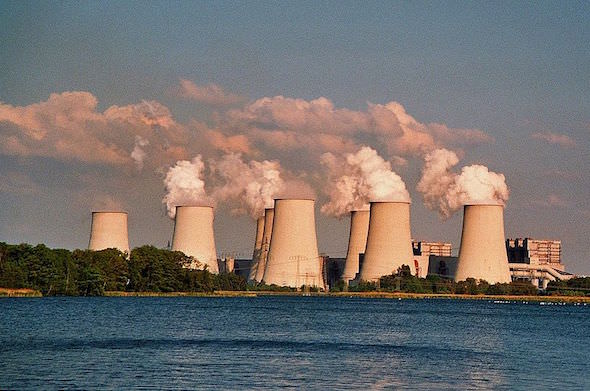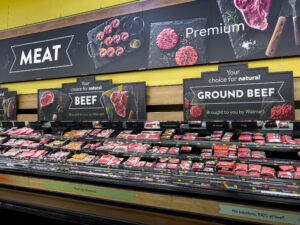Serious Doubts Over Europe’s Greenhouse-Gas Reduction Target
Europe has made substantial progress in cutting greenhouse gas emissions, but its long-term reduction aims look unachievable, says a new report.
By Kieran Cooke, Climate News Network

The Jänschwalde power station in Germany burns highly polluting brown coal. (J H Janssen via Wikimedia Commons)
This Creative Commons-licensed piece first appeared at Climate News Network.
LONDON — The 28 countries of the European Union (EU) have set themselves a collective target of cutting emissions of climate-changing greenhouse gases (GHGs) by between 80% and 95% by 2050, but a major report just released says there’s little hope of achieving that goal.
Every five years, the European Environment Agency (EEA) produces a comprehensive study, and the latest says projected declines in GHG emissions are not nearly enough to reach the long-term target of decarbonising most of Europe’s economy by mid-century.
The report says there has been considerable progress in recent years on reducing Europe’s GHG emissions to 19.2% below 1990 levels, while, at the same time, gross domestic product across the EU has increased by 45%. EU per capita emissions fell from 11.8 tonnes of CO2 equivalent in 1990 to 9 tonnes in 2012.
The trouble is that this progress is very unlikely to be maintained over the long term unless the entire EU economy is revamped and there are very substantial investments in renewables.
Hard part ahead
The cut in GHG emissions was largely achieved through economic restructuring in eastern Europe following the collapse of the old Soviet Union and associated states. Polluting energy and industrial plants were closed, and agricultural practices modernised.
The 2008 economic crisis also caused a dip in emissions, while EU policies aimed at achieving greater energy efficiency have also played an important role in reducing emissions.
That, in many ways, was the easy part. Now comes the big challenge: in order to achieve its long-term emissions reduction objective, Europe needs a wholesale reorganisation of its economy, says the EEA, and also needs to become less resource-hungry.
Fossil fuels still dominate energy production, accounting for 75% of energy supply in 2011 — the most recent year for which comprehensive statistics are available.
Progress achieved
“The EU will need to accelerate its implementation of new policies, while restructuring the ways that Europe meets its demand for energy, food, transport and housing,” the report says.
Short-term goals can be achieved, says the EEA, and the EU is on track to meet its target of producing 20% of its energy from renewable sources by 2020. Renewables accounted for 11% of EU energy production in 2012 — up from 4% in 1990.
It is a similar story across much of the European environment. Progress has been made over recent years in improving water systems, waste collection and recycling, and in rehabilitating some ecosystems.
“In many parts of Europe, the local environment is arguably in as good a state today as it has been since the start of industrialisation,” the report says. “Reduced pollution, nature protection and better waste management have all contributed.”
Worsening air
At the same time, what the report refers to as Europe’s natural capital is being seriously degraded by the activities of agriculture, fisheries, industries and tourism. Urban sprawl is also having a negative impact.
In some regions, ecosystems are in a dire state, and the EU is not on track to meet its 2020 target on halting biodiversity loss.
Air quality is a particular concern. The EEA estimates that more than 400,000 people in Europe died prematurely in 2011 due to breathing in toxic fumes. In some areas, air quality is getting worse, not better. And land is under severe pressure.
The report says that “loss of soil functions, land degradation and climate change remain major concerns, threatening the flows of environmental goods and services that underpin Europe’s economic output and well-being”.
Your support is crucial...As we navigate an uncertain 2025, with a new administration questioning press freedoms, the risks are clear: our ability to report freely is under threat.
Your tax-deductible donation enables us to dig deeper, delivering fearless investigative reporting and analysis that exposes the reality beneath the headlines — without compromise.
Now is the time to take action. Stand with our courageous journalists. Donate today to protect a free press, uphold democracy and uncover the stories that need to be told.






You need to be a supporter to comment.
There are currently no responses to this article.
Be the first to respond.